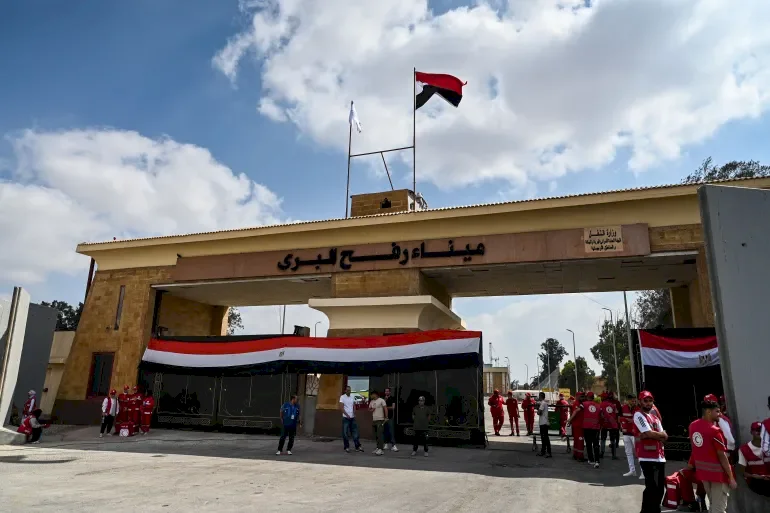
Former Israeli Ambassador: Erosion of the Security Annex in Camp David Warns of Confrontation with Egypt
Sada News - The former Israeli ambassador to Egypt and Morocco, David Govrin, claimed that Egypt "has been gradually eroding the security annex of the Camp David agreement for years by imposing new facts on the ground." In an article published by the Israeli newspaper "Yedioth Ahronoth," he stated, "The recent developments in Gaza might provide Cairo with a pretext to unprecedentedly enhance its military presence in Sinai," warning that this "could open the door to a future confrontation between the two countries." Govrin believes that the security annex reached after lengthy and exhausting negotiations in the Camp David agreement, signed on September 17, 1978, between Egypt and Israel, constituted a strategic achievement for Israel. He added that the legal advisor to the Israeli Foreign Ministry at the time, Meir Rosen, insisted on disarmament arrangements as a guarantee for Israel after its withdrawal from Sinai and the loss of what he called strategic depth, emphasizing that this clause is one of the most important gains that Israel achieved from the treaty. From the perspective of the former Israeli ambassador, "Egypt has viewed these arrangements as a violation of state sovereignty." He mentioned that the Egyptian officials he met during his service in Cairo "considered that the time had come to lift the military restrictions in Sinai." He also mentioned in his article that "the Egyptians used the term diminished sovereignty to describe the restrictions imposed on them, as Israel dictated the numbers of soldiers and types of weapons allowed." Govrin cited Egyptian President Abdel Fattah el-Sisi's visit to the "Military Base" in April 2018, where a video from the Egyptian army showed F-16 fighter jets lined up on the runways, even though their flights are prohibited in the skies of Sinai under the security annex. The author viewed this as "a symbolic step that was a clear message regarding Egypt's desire to practically undermine the restrictions under the pretext of the war on terror." He pointed out that Cairo "has requested on several occasions from Israel to allow an increase in its forces in Sinai under the pretext of confronting armed groups, which has contributed to a gradual change in the reality." However, he did not mention whether Egypt received Israeli approval for this or not. The article addressed Egypt's significant concerns about the potential influx of Palestinians into its territory due to ongoing Israeli displacement and extermination operations in the Gaza Strip, affirming that Cairo considers this a direct threat to its national security and rejects any settlement that occurs at its expense. He also referred to the rejection by President Sisi early this year of the proposal made by US President Donald Trump to host Palestinians in Sinai in exchange for a generous financial package, which reveals the sensitivity of this file for Cairo. Potential Confrontation Govrin noted Sisi's recent speech at the Arab-Islamic summit held recently in Qatar, where he described Israel as an "enemy," a precedent since the signing of the peace treaty. He considered this description reflects accumulated Egyptian anger due to the extermination war in Gaza, in addition to Israel freezing the approval of a massive gas deal worth $35 billion. According to Govrin, the Israeli escalation in Gaza and Egypt's fear of a refugee influx prompted Cairo to reinforce its military presence in Rafah, which may turn into a launchpad for a permanent change in the balance of forces in Sinai. He warned that the continuation of this process might provide Egypt with an opportunity to exploit the circumstances to expand its military presence, while maintaining it even after the end of the war, resembling a gradual erosion of the security annex. To avoid this possibility, he calls on Israel "to clarify officially, publicly, and decisively that it does not intend to carry out a forced migration of Palestinians from the Gaza Strip, noting that such a statement from a senior political source would alleviate the tensions in the media discourse between the two sides." He also warned that "the most dangerous scenario is represented in Cairo linking the withdrawal of the Israeli army from the Philadelphi corridor with preserving the agreement, which would put Tel Aviv in a real dilemma." According to Govrin, Israel will face difficulties relying on the multinational force in Sinai or even on the United States to force Egypt to return to previous restrictions, potentially leaving it facing a new reality of a stronger and more deployed Egyptian army on its southern borders. The former Israeli ambassador concluded his article by saying, "The alternative to the Palestinian Riviera in Gaza could be a new military confrontation with Egypt," indicating that ongoing erosion of the security annex could revive the specter of confrontation between the two largest armies in the region and undermine one of Israel's most significant achievements since signing the peace treaty more than four decades ago.

High-level sources reveal to SadaNews: Washington seeks to hold a Gaza Reconstruction Conf...

9 Dead and Dozens Injured in Beit Shemesh, Shrapnel Hits Jerusalem, Haifa, and Tiberias

30 Bombs.. A "Unique" Moment Exploited by Washington and Tel Aviv to Target the Supreme Le...

Iran Confirms Khamenei's Death and Announces 40 Days of Mourning

Exclusive SadaNews: What is the Secret behind the Timing of the Israeli-American Attack?!

Israel Deducts 258 Million Shekels from Palestinian "Clearing" Funds for the Benefit of Fa...

Where Does the Second Phase of the Ceasefire Agreement Stand?!

